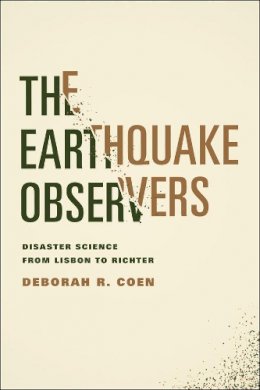17%OFF

Stock image for illustration purposes only - book cover, edition or condition may vary.
The Earthquake Observers
Deborah R. Coen
€ 95.56
€ 79.50
FREE Delivery in Ireland
Description for The Earthquake Observers
Hardcover. Earthquakes have taught us much about our planet's hidden structure and the forces that have shaped it. This title explains how observing networks transformed an instant of panic and confusion into a field for scientific research, turning earthquakes into natural experiments at the nexus of the physical and human sciences. Num Pages: 368 pages, 14 halftones, 1 line drawing. BIC Classification: 3JH; 3JJ; PDX; RBC. Category: (G) General (US: Trade). Dimension: 236 x 162 x 25. Weight in Grams: 642.
Earthquakes have taught us much about our planet's hidden structure and the forces that have shaped it. This knowledge rests not only on the recordings of seismographs, but also on the observations of eyewitnesses to destruction. During the nineteenth century, a scientific description of an earthquake was built of stories - stories from as many people in as many situations as possible. Sometimes their stories told of fear and devastation, sometimes of wonder and excitement. In "The Earthquake Observers", Deborah R. Coen acquaints readers not only with the century's most eloquent seismic commentators, including Alexander von Humboldt, Charles Darwin, Mark ... Read more
Earthquakes have taught us much about our planet's hidden structure and the forces that have shaped it. This knowledge rests not only on the recordings of seismographs, but also on the observations of eyewitnesses to destruction. During the nineteenth century, a scientific description of an earthquake was built of stories - stories from as many people in as many situations as possible. Sometimes their stories told of fear and devastation, sometimes of wonder and excitement. In "The Earthquake Observers", Deborah R. Coen acquaints readers not only with the century's most eloquent seismic commentators, including Alexander von Humboldt, Charles Darwin, Mark ... Read more
Product Details
Format
Hardback
Publication date
2012
Publisher
The University of Chicago Press United States
Number of pages
368
Condition
New
Number of Pages
360
Place of Publication
, United States
ISBN
9780226111810
SKU
V9780226111810
Shipping Time
Usually ships in 7 to 11 working days
Ref
99-1
About Deborah R. Coen
Deborah R. Coen is assistant professor of history at Barnard College, Columbia University. She is the author of Vienna in the Age of Uncertainty: Science, Liberalism, and Private Life, also published by the University of Chicago Press.
Reviews for The Earthquake Observers
Nature "Crowd-sourced science has rarely been so thrilling. As Deborah R. Coen reveals, the rumbustious history of seismology began with roving scientists gathering locals' accounts of shocks, shudders and thumps. Luminaries from Charles Darwin to Alexander von Humboldt reported, too; Charles Dickens likened a quake to a great beast 'shaking itself and trying to rise.' Coen argues for a hybridized ... Read more
